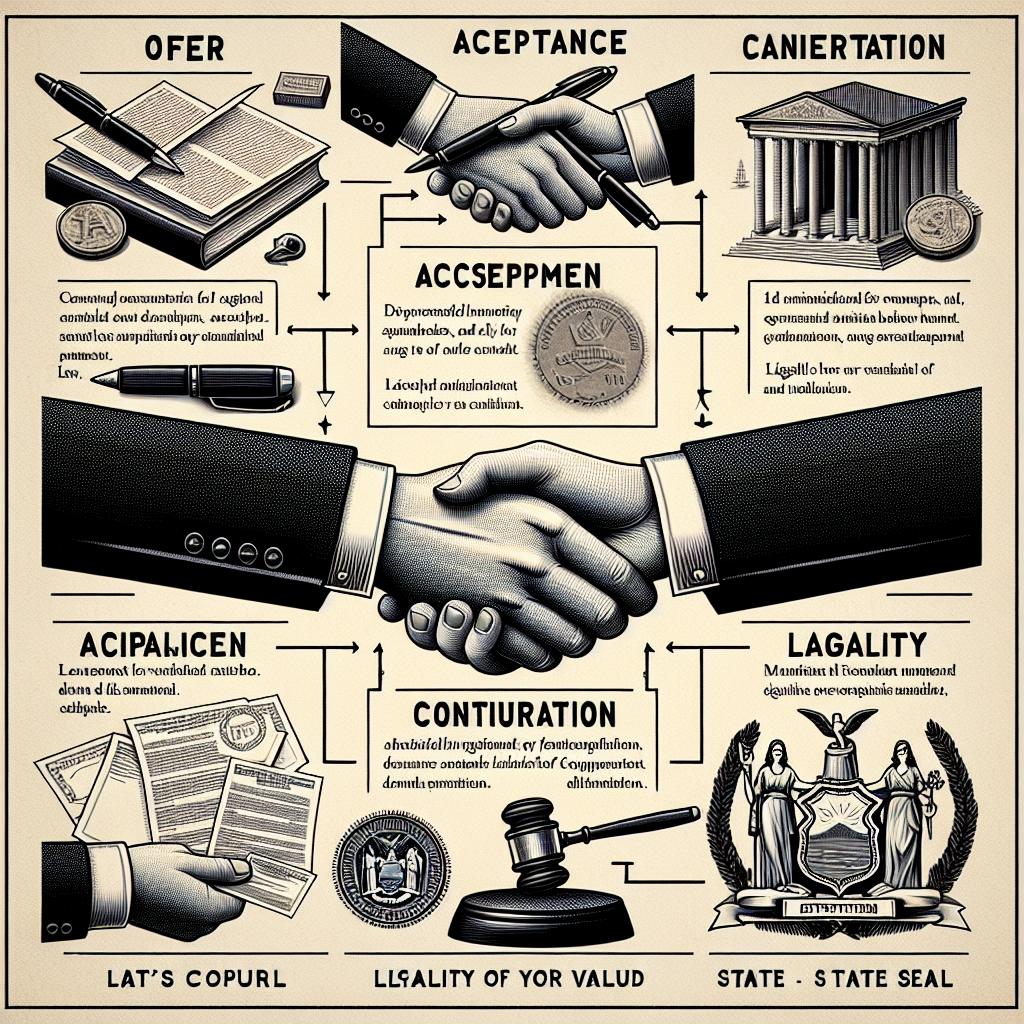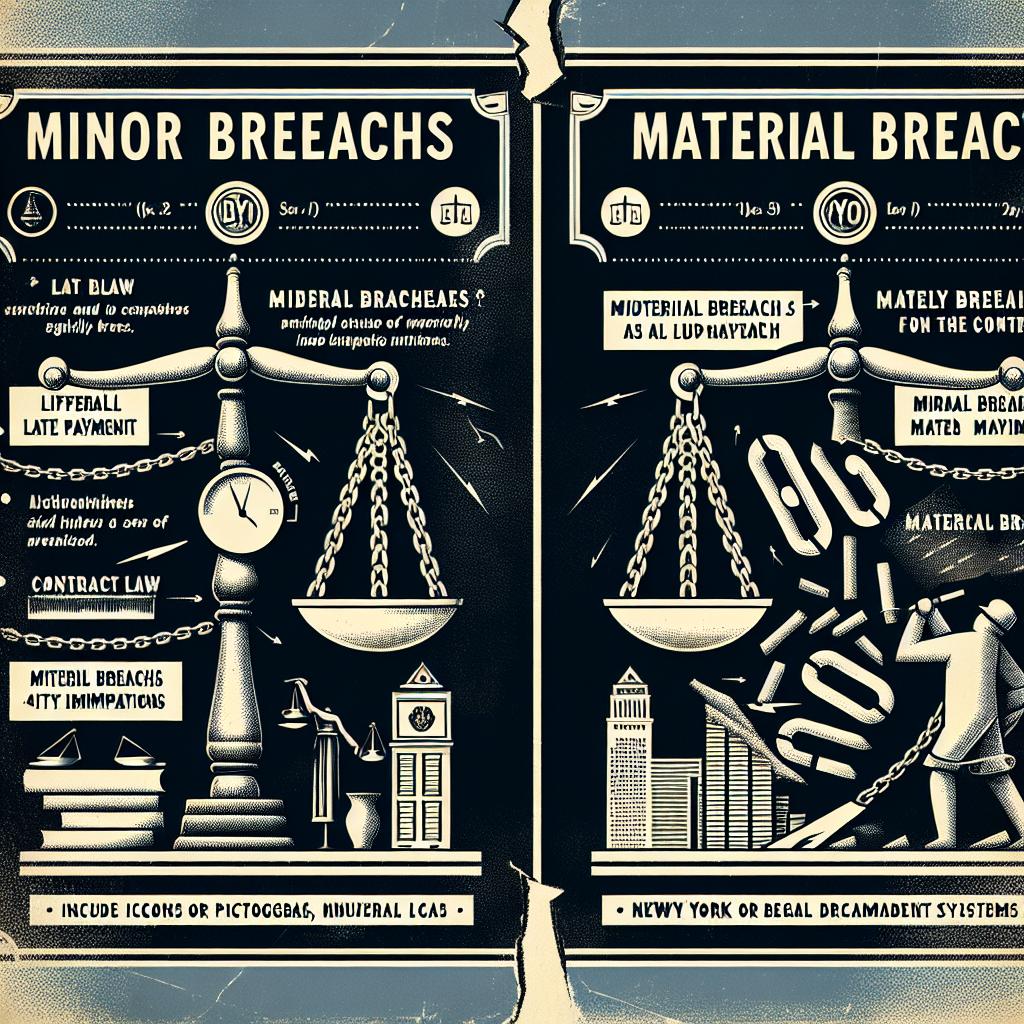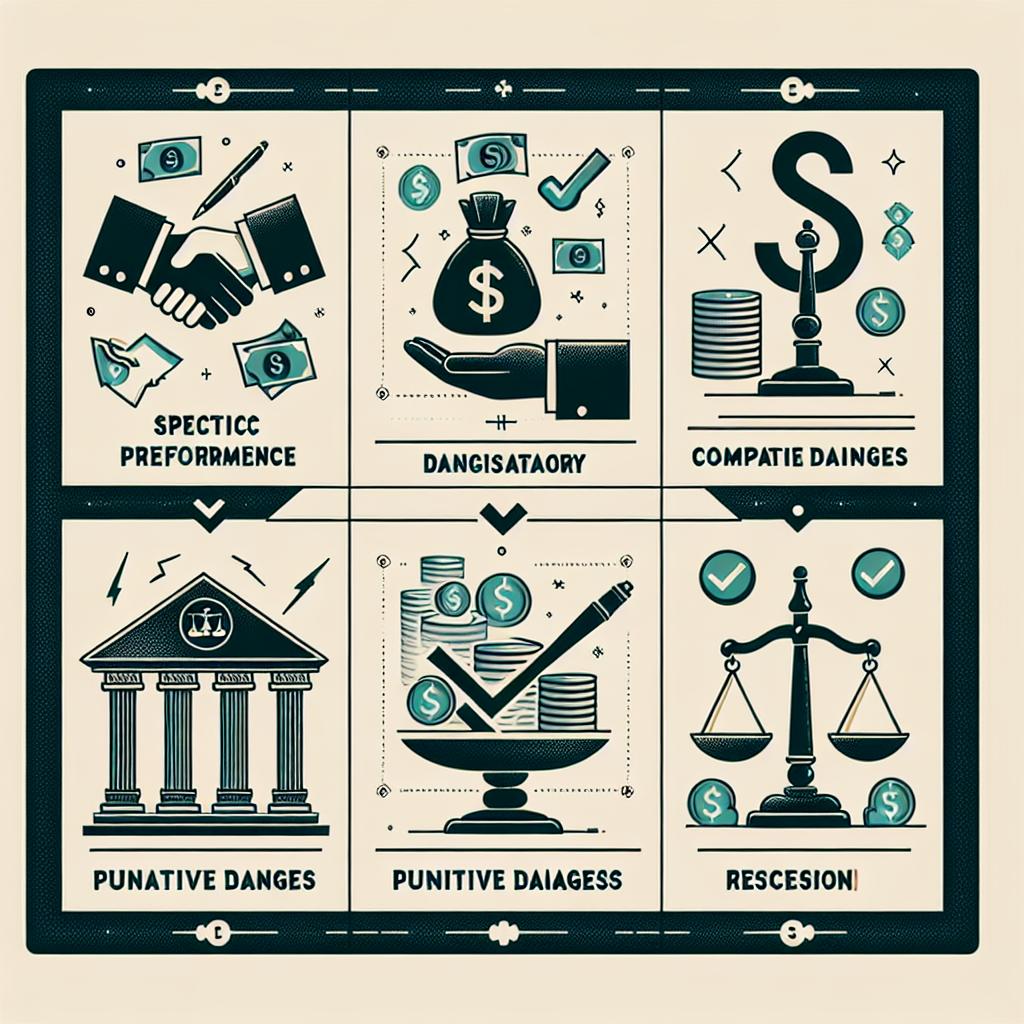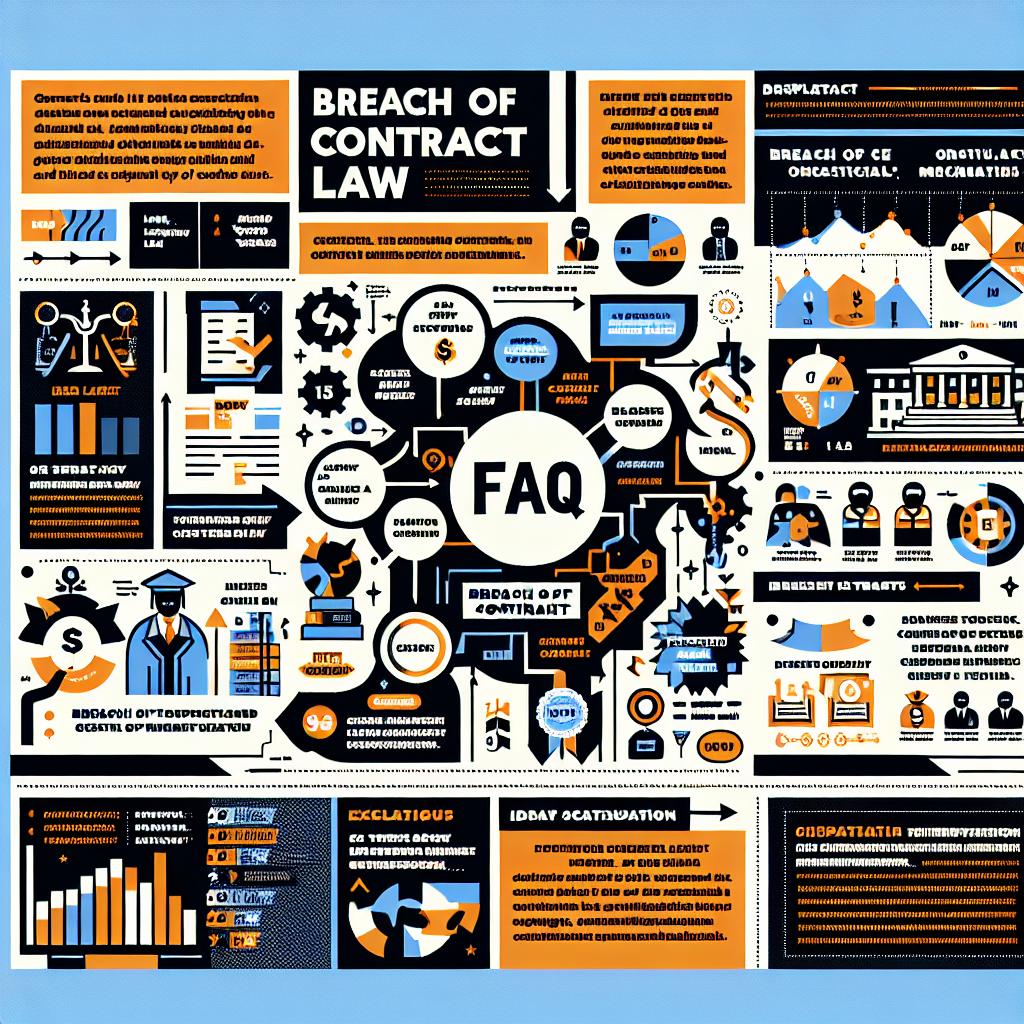Discover the essentials of contract law in New York, including breach types, key elements, remedies, and FAQs for better legal understanding.In the bustling legal landscape of New York, understanding breach of contract law is essential for individuals and businesses alike. Whether you’re entering a lease agreement, hiring a contractor, or concluding a partnership, the intricacies of contract law can significantly impact the validity of your agreements. This article aims to demystify breach of contract law in New York by outlining what constitutes a breach, the key elements of contract law, and the differences between minor and material breaches. Additionally, we’ll explore how to identify such breaches and the remedies available under New York law. Lastly, we’ll emphasize the importance of understanding these legal principles to safeguard your interests and ensure fair dealings. Join us as we delve into the nuances of contract law and equip yourself with the knowledge to navigate potential disputes effectively.
What Constitutes A Breach Of Contract In New York

In the realm of Contract Law in New York, a breach of contract occurs when one party fails to fulfill their obligations under the terms of a legally binding agreement. This failure can manifest in several forms, which are crucial for determining the nature and consequences of the breach.
Generally, a breach of contract can be classified as either an actual breach or a constructive breach. An actual breach occurs when a party fails to perform their obligations on or before the due date. This can include failing to deliver goods, providing substandard services, or simply refusing to perform altogether.
A constructive breach, on the other hand, occurs when a party does not fulfill their contractual obligations but does so in a way that makes it impossible for the other party to perform their own obligations. For instance, if a landlord refuses to make necessary repairs, it may hinder the tenant’s ability to fulfill their lease obligations.
Moreover, for a breach to be actionable under Contract Law in New York, it must be material. A material breach is one that significantly undermines the contract’s intended purpose, as opposed to a minor breach, which does not cause substantial harm. Understanding the distinction between these types of breaches is essential when assessing your rights and remedies in a contractual dispute.
In summary, recognizing what constitutes a breach, whether actual or constructive, and distinguishing between material and minor breaches are fundamental aspects of navigating Contract Law in New York. These elements will guide parties involved in contracts to make informed decisions about their legal options when faced with a breach.
Key Elements Of Contract Law In New York

Understanding the Contract Law in New York is essential for anyone entering into a legally binding agreement within the state. There are several key elements that form the foundation of contract law, which are crucial for determining the enforceability of a contract. The following elements outline what must be present for a contract to be legally binding in New York:
When any of these elements are lacking, a contract may be deemed void or voidable under Contract Law in New York. Understanding these elements is crucial for individuals or businesses looking to draft and enforce contracts.
Types Of Breach: Minor Vs. Material Breaches

In the realm of Contract Law in New York, understanding the distinction between minor and material breaches is crucial for both parties involved in a contract. A breach occurs when one party fails to fulfill their contractual obligations, and the nature of the breach significantly influences the available remedies and the outcomes of potential disputes.
A minor breach, also known as a partial breach, refers to a situation where the terms of the contract are not completely met, but the failure to perform does not significantly undermine the contract’s overall purpose. For instance, if a contractor completes a job but fails to paint a specific section of the project, the breach is considered minor. In such cases, the non-breaching party is typically entitled to damages, but these damages are usually limited to the cost of the incomplete part of the contract.
On the other hand, a material breach is a serious violation that affects the contract’s core purpose, essentially undermining its value. This type of breach allows the non-breaching party to terminate the contract and seek further damages. An example of a material breach might be if a supplier fails to deliver essential materials, thereby halting production and causing significant financial loss to the business reliant on those goods.
Understanding whether a breach is minor or material is vital because it shapes how the parties may respond. In the context of Contract Law in New York, a clear classification of the breach aids in determining legal recourse, allowing the affected party to make informed decisions on how to proceed, including whether to pursue litigation or seek alternative dispute resolution.
How To Identify A Breach Of Contract In New York

Identifying a breach of contract in New York involves a careful assessment of the agreement and the actions (or inactions) of the parties involved. Here are some critical steps to follow:
1. Review the Contract: Start by revisiting the contract’s terms. The definition of a breach is heavily reliant on the specific provisions outlined in the contract. Look for clauses that delineate performance obligations and timelines.
2. Determine Performance Expectations: Assess whether each party met its obligations. In New York, a breach occurs when one party fails to fulfill its duties as stipulated in the agreement, which may involve failure to deliver goods, provide services, or adhere to payment terms.
3. Identify the Type of Breach: Distinguish between minor breaches and material breaches. A minor breach may not affect the overall contract’s purpose, whereas a material breach undermines the contract’s foundation. Understanding this distinction is crucial as it affects the remedies available.
4. Gather Evidence: Collect relevant documentation, such as emails, letters, and records of verbal agreements, to substantiate your claims of breach. Documentation serves as critical evidence in any potential legal dispute.
5. Communicate with the Other Party: Reach out to the other party to confirm any misunderstandings or discrepancies. Sometimes, what appears to be a breach may be a simple miscommunication.
6. Consult Legal Counsel: If you believe you’ve identified a breach, consulting with an attorney who specializes in Contract Law in New York is highly recommended. They can provide clarity on your legal position and suggest possible courses of action.
By following these steps, you can effectively identify whether a breach has occurred under Contract Law in New York, enabling you to take appropriate steps towards resolution or remedy.
Remedies Available Under New York Contract Law

When a breach occurs, understanding the remedies available under Contract Law in New York is crucial for affected parties to seek justice and compensation. The primary remedies available typically fall into three main categories:
1. Compensatory Damages: These are designed to cover the actual loss suffered by the non-breaching party. Compensatory damages aim to put the injured party in the position they would have been in had the breach not occurred. This can include lost profits, expenses incurred due to the breach, and any other financial losses directly related to the breach.
2. Consequential Damages: Also known as special damages, these are losses that do not flow directly from the breach but are a consequence of the breach. For a party to recover consequential damages, they must demonstrate that the breaching party was aware that such damages were possible at the time the contract was formed.
3. Specific Performance: In some cases, a court may order the breaching party to fulfill their contractual obligations rather than allowing them to pay damages. This remedy is more common in contracts involving unique goods or properties, such as real estate, where monetary compensation would not suffice.
4. Rescission: This remedy involves the annulment of the contract and discharges all parties from their obligations. Rescission is typically sought when one party has been misled or when the contract was entered into under duress, undue influence, or mutual mistake.
5. Reformation: This remedy is used to amend the contract to reflect the true intentions of the parties involved. Courts may resort to reformation when there has been a mistake in the drafting of the contract, ensuring that the agreement aligns with what both parties intended.
In summary, understanding the remedies available under Contract Law in New York is essential for any party involved in a contractual dispute. Whether seeking monetary compensation or enforcement of the contract, knowing these options can significantly influence the resolution of a breach of contract case.
The Importance Of Understanding Contract Law In New York
Understanding Contract Law in New York is crucial for individuals and businesses alike. A solid grasp of this legal framework not only informs parties of their rights and obligations but also equips them with the knowledge necessary to navigate potential disputes efficiently. Here are several key reasons why understanding Contract Law in New York is essential:
- Informed Decision-Making: Knowing the nuances of Contract Law in New York allows individuals and business owners to make informed decisions when entering into agreements. Awareness of the terms, conditions, and enforceability of contracts can prevent costly mistakes.
- Risk Management: A comprehensive understanding of contract law helps in identifying and mitigating risks associated with breaches or non-compliance. This proactive approach can save significant legal costs and protect one’s interests.
- Effective Negotiations: Understanding Contract Law in New York enables individuals to negotiate contracts effectively. Clarity on legal terms can lead to better deals and favorable conditions for all parties involved.
- Legal Rights and Remedies: Familiarity with New York’s contract laws helps individuals understand their legal rights in case of breach and informs them of the available remedies. This knowledge is crucial for enforcing one’s rights in a court of law.
- Avoiding Disputes: When parties understand the obligations that contracts impose, it reduces the likelihood of misunderstandings that could lead to disputes. Clear contracts, well understood by both parties, pave the way for smoother business operations.
In conclusion, whether you are a business owner, a contractor, or an individual entering into any agreement, understanding Contract Law in New York is indispensable. It not only aids in navigating the complexities of legal agreements but also empowers you to safeguard your interests in a myriad of situations.
Frequently Asked Questions
 What is a breach of contract?
What is a breach of contract?
A breach of contract occurs when one party fails to fulfill their obligations as outlined in the contract, which can include not performing on time, not performing to the agreed standards, or failing to perform at all.
What are the types of breaches recognized in New York law?
New York law recognizes two main types of breaches: material breaches, where the violation substantially undermines the contract, and minor breaches, where the violation does not significantly impact the contract’s overall purpose.
What are the potential remedies for a breach of contract in New York?
Potential remedies for a breach of contract in New York include compensatory damages, consequential damages, specific performance, and rescission, depending on the nature of the breach and the contract terms.
How can parties to a contract prove a breach occurred?
To prove a breach of contract in New York, the aggrieved party must show the existence of a valid contract, that they performed their obligations under the contract, that the other party failed to fulfill their obligations, and that this failure resulted in damages.
Are verbal contracts enforceable in New York?
Yes, verbal contracts can be enforceable in New York; however, certain contracts, such as those involving real estate transactions or agreements lasting over a year, must be in writing to be enforceable under the Statute of Frauds.
What is the statute of limitations for contract disputes in New York?
In New York, the statute of limitations for bringing a breach of contract claim is generally six years from the date of the breach.
Can a party recover attorney’s fees if a contract is breached in New York?
In New York, attorney’s fees are typically not recoverable unless expressly provided for in the contract. If the contract includes a provision for attorney’s fees, then the prevailing party can recover those costs.
